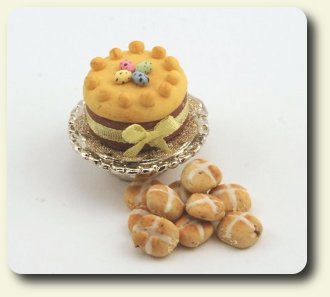

 Rabbits don't lay eggs, nor do hares, but hares do bring up their young in hollows in the ground called "forms" and plovers have been known to take over a form, filling it with their eggs.
Rabbits don't lay eggs, nor do hares, but hares do bring up their young in hollows in the ground called "forms" and plovers have been known to take over a form, filling it with their eggs.
 Legend has it that a woman hid some coloured eggs in a form for her children to find and as they approached a hare hopped away - leaving them to believe that the hare brought the eggs and the tradition was born! The idea of a giant supernatural rabbit laying millions of eggs in one night is pretty ridiculous but, fortunately, children have wonderful imaginations that make this seem quite normal!
Legend has it that a woman hid some coloured eggs in a form for her children to find and as they approached a hare hopped away - leaving them to believe that the hare brought the eggs and the tradition was born! The idea of a giant supernatural rabbit laying millions of eggs in one night is pretty ridiculous but, fortunately, children have wonderful imaginations that make this seem quite normal!
Besides chocolate, there are many Easter food traditions. In Italy, favourites include Easter bread and Easter pie.
 Coming after the long and lean winter months and the fasting of Lent, Easter day offers cooks a welcome return to the kitchen for the creation of special foods.
Coming after the long and lean winter months and the fasting of Lent, Easter day offers cooks a welcome return to the kitchen for the creation of special foods.
ABOVE:
Courtney Strong of Courts Miniatures created Easter cakes in 1:4 scale;
Agnes Turpin, quarter scale Easter cakes and sweets display;
Loredana Tonetti has created a Easter chick pulling an egg wagon.
A traditional breakfast could be as simple as a boiled egg or a sweet braided yeast bread decorated with colourful hard-boiled eggs. Hot cross buns are consumed throughout the holiday season, but are traditionally eaten on Good Friday. These small, sweet yeast buns contain raisins, currants and sometimes candied fruit and feature a cross slashed into the top of the bun before baking.
 After baking it is filled is filled with confectioners' sugar icing.
After baking it is filled is filled with confectioners' sugar icing.
Roast lamb served with mint sauce and vegetables would be the traditional main meal on Easter day with custard tarts served with flat Easter biscuits for dessert.
The simnel cake, a rich fruit cake covered with a thick layer of marzipan and baked with a layer of marzipan in the middle, is a traditional tea time treat. Eleven balls of marzipan ring the top to represent the 11 disciples - Judas is not represented as he was not considered to be a true disciple!
Legend has it that the Simnel cake was named after a couple, Sim and Nell, who invented the cake by using up various leftover ingredients they had lying around. It's more likely, however that it originated from the Latin "Simila," meaning fine wheaten flour. In Medieval days female servants would bake this fruit-rich Easter cake to take on their rare visits home to their mothers on Mothering Sunday, the fourth Sunday of Lent.
Custom Dolls, Houses & Miniatures / CDHM







